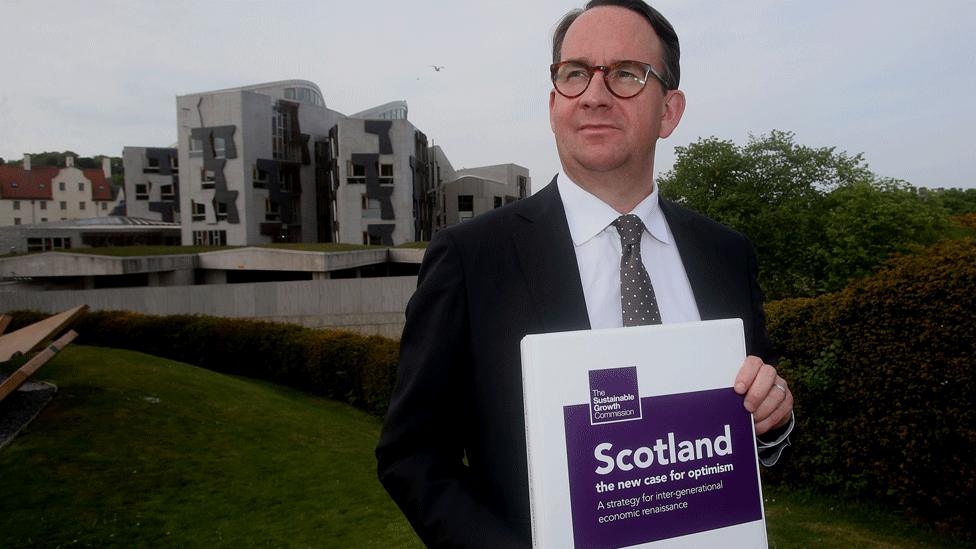GERS: A challenge to change
- Published

GERS shows the gap between Scottish tax take and spending is big, but coronavirus is set to make it humongous, with fiscal repairs requiring years of effort.
Annual publication fires up the independence debate. Allied to the current crisis, and a point of disruption, there is a case for revisiting the economic case for independence.
The case for independence may yet be won on non-economic grounds, but even if it is, there will still be a need to set out an economic plan.

It's a brave person who forecasts where we'll be a year from now, but it's a reasonable bet that there will be a humongous gap between taxation and spending in Scotland when the GERS figures are published next August.
The Government Expenditure and Revenue Scotland reckoning highlights a gap for 2019-20 that already looks alarmingly large, at £15.1bn, and 8.6% of Scottish output.
That had only a tail-end impact from the start of the pandemic crisis. Since then, billions have been poured into the health effort, disease controls, and mitigating the impact of lockdown on businesses and individuals.
The UK government is forecast by the Office for Budget Responsibility (OBR) to have a budget deficit this year of at least 16% of GDP (the standard measure of total economic output), which would be the highest in peacetime, up from 2.5% last year. The benchmark safe and sustainable ceiling for borrowing in any one year is reckoned by the European Union to be 3%.
Strictly speaking, the OBR is not offering a forecast, but a scenario, and the central scenario (not too hot, not too cold, but merely astonishing) rises to perhaps 19%.
So if that's the scale of increased deficit, what about Scotland? The Institute of Fiscal Studies has run the numbers, and on the same basis, it reckons the GERS figures could be showing a notional deficit for 2020-21 of about 27%.
Rich country club
What does that mean? For every £100 generated in the economy, £27 would have to be borrowed just to pay for government spending commitments and make up for the shortfall in tax.
That would be up there with the worst of wartime years in the 1940s, when tax revenue was very low and money was being borrowed and poured into the battle for survival - these days meaning grants and loans to businesses, with furlough payments, rather than stepping up munitions and Spitfire production.
But at least the pandemic year should be a one-off, right? Well, not so fast. We don't know if the pandemic and lockdowns continue into 2021-22.
Even if they don't, repairing the fiscal damage is going to take time. To keep going with the OBR scenario, the UK could still be facing a deficit of 4.6% four years from now. And David Phillips, at the IFS, has extended that Scottish assessment, to reach a deficit of 11%. That's the same level as the worst year of the financial crash just over a decade ago.
It's clear that the UK is not going to be alone in facing these challenges. But there's a reminder from the Organisation of Economic Co-operation and Development, the rich country's club, that the UK has so far come off among the worst from the economic downturn.

Andrew Wilson was chairman of the Sustainable Growth Commission set up by the SNP
And that feeds through to the Scottish independence debate, which gets re-provisioned with GERS ammunition at this time of year. The figures released this week will be the last for some years that reflect a sort of stable equilibrium.
They come as a reminder that the economic case for independence remains in a state of flux. There was a big growth commission, chaired by former SNP MSP Andrew Wilson, which gave the party faithful some difficult home truths about closing that fiscal gap. But in getting Scotland onto a faster growth path to help achieve that, it left a lot of awkward choices yet to be made about tax and spending levels.
The economist and public finance wonk John McLaren has gone back into the argument, and come up with some further challenges for the independence cause. At current rates of growth, he argues that Andrew Wilson's 10-year plan to fiscal sustainability will require deeper spending cuts than the past 10 years have seen, and even more so for programmes other than health if that continues to gobble a growing share of the budget.
Dr McLaren is not seen as a friend of the independence cause, but he seems genuine when he offers advice - to get back into the economic case for independence, and use this moment of tumult and disruption to set a new path for the economy.
He points out that the economic model offered to Scottish voters by the SNP has been something similar to the UK's one, but tweaked and improved with fairness bells and growth whistles.
Resilience and flexibility
However, there's evidence that people want to see change coming out of the current pandemic crisis: less inequality, a much cleaner, greener environment, improved health and care services with better paid workers, and a better work-life balance than we have had.
The pressure is on to shorten supply chains and reverse the process of globalisation. That would mean sacrificing efficiency and cheap consumer goods to achieve a higher level of resilience.
Applied to public services, that raises the question: can we afford to have an NHS that runs close to capacity at all times, when we now know it needs more capacity and flexibility to handle sudden surges in demand?
The Scottish government would catch some of these within the broad notion of 'wellbeing', the vaguely-defined concept with which it is seeking to balance the SNP's past focus on economic growth.
But rather than tweaking, Dr McLaren is saying this might be the time to spell out more clearly what a wellbeing economy would look like - with significantly higher taxes, for instance, similar to Scandinavia?
The answer to that used to be 'no need - we've got North Sea oil revenues'. But that can no longer be the case.
Matching reality
And he's raising a more political point. Where is the leadership in this? Ministers are rather busy dealing with short-term challenges. Some perceive the SNP as being too absorbed in internal battles. So is anyone else - other, perhaps, than Andrew Wilson - doing the heavy-lifting for setting out that economic case?
It might be that there's no need. The independence cause and another referendum might well be won on non-economic issues, such as identity, or through the failure of the pro-union side to mobilise an effective counter-offer and campaign.
But there's a warning that comes from observing Brexit. John McLaren says it is essential that the basic economic and fiscal principles of any new beginning are clearly laid out and coherent: "To avoid doing so, as with Brexit, is asking for trouble".
In other words, if you win, you'd better be sure what you're going to do next, and prepare the ground for the possibility that easily-made campaign pledges don't match up to reality.
- Published26 August 2020

